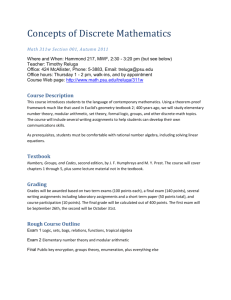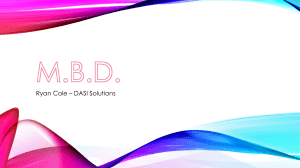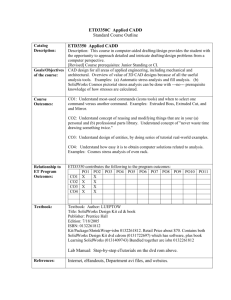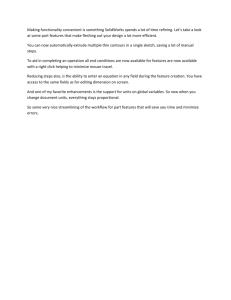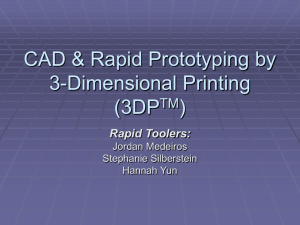Section 19
advertisement
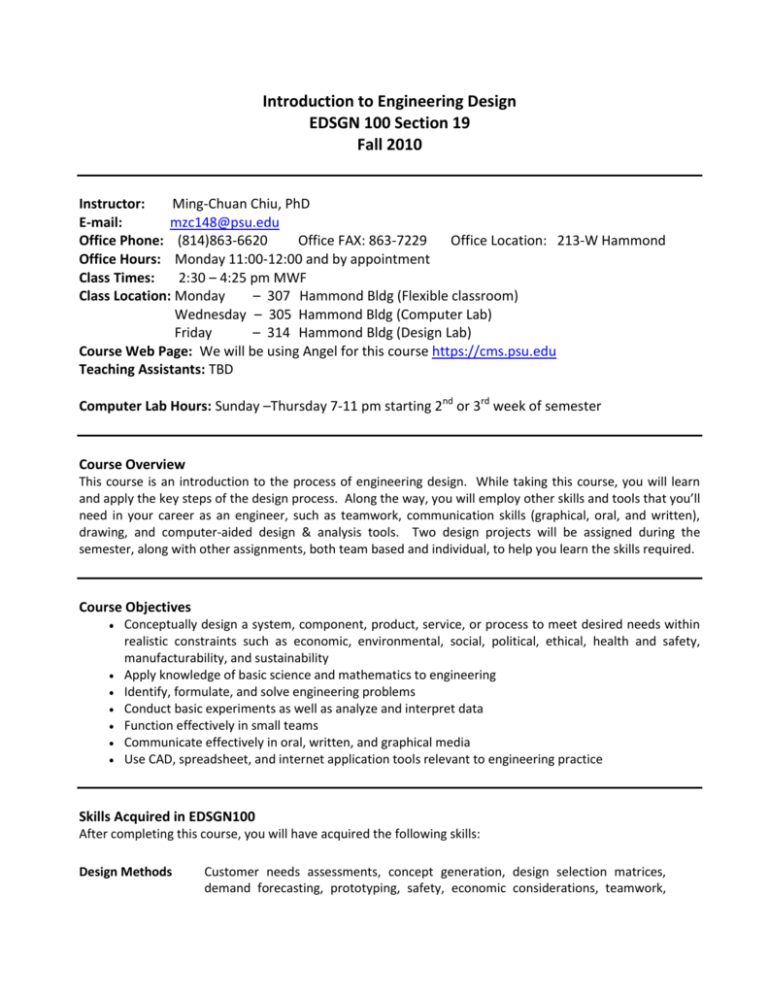
Introduction to Engineering Design EDSGN 100 Section 19 Fall 2010 Instructor: Ming-Chuan Chiu, PhD E-mail: mzc148@psu.edu Office Phone: (814)863-6620 Office FAX: 863-7229 Office Location: 213-W Hammond Office Hours: Monday 11:00-12:00 and by appointment Class Times: 2:30 – 4:25 pm MWF Class Location: Monday – 307 Hammond Bldg (Flexible classroom) Wednesday – 305 Hammond Bldg (Computer Lab) Friday – 314 Hammond Bldg (Design Lab) Course Web Page: We will be using Angel for this course https://cms.psu.edu Teaching Assistants: TBD Computer Lab Hours: Sunday –Thursday 7-11 pm starting 2nd or 3rd week of semester Course Overview This course is an introduction to the process of engineering design. While taking this course, you will learn and apply the key steps of the design process. Along the way, you will employ other skills and tools that you’ll need in your career as an engineer, such as teamwork, communication skills (graphical, oral, and written), drawing, and computer-aided design & analysis tools. Two design projects will be assigned during the semester, along with other assignments, both team based and individual, to help you learn the skills required. Course Objectives Conceptually design a system, component, product, service, or process to meet desired needs within realistic constraints such as economic, environmental, social, political, ethical, health and safety, manufacturability, and sustainability Apply knowledge of basic science and mathematics to engineering Identify, formulate, and solve engineering problems Conduct basic experiments as well as analyze and interpret data Function effectively in small teams Communicate effectively in oral, written, and graphical media Use CAD, spreadsheet, and internet application tools relevant to engineering practice Skills Acquired in EDSGN100 After completing this course, you will have acquired the following skills: Design Methods Customer needs assessments, concept generation, design selection matrices, demand forecasting, prototyping, safety, economic considerations, teamwork, ethics Computing SolidWorks (Solid Modeling/CAD), MS Excel (spreadsheets), MS Power Point (multimedia presentations) Internet Using the world wide web, creating HTML documents, web reports, personal web pages Graphics Multiview, isometric, and oblique sketching; dimensioning drawings; section drawings; working drawings Lab Work Experimental methods, data acquisition and analysis, prototype building and testing Presentations Develop and present a technical presentation both as part of a team and individually Required Text Introduction to Engineering Design - McGraw Hill Learning Solutions,©2008 (paperback) ISBN-13: 978-0-07-723421-8 Recommended Text Engineering Design: A Practical Guide, by Madara Ogot and Gül Kremer. Trafford Publishing, 2004. Required Equipment Staedler Geoset - 8 piece Geometry Set; available at Penn State Bookstore; includes 45/90 degree triangle, 30/60 degree triangle, compass, protractor, 0.5 mm fine line pencil, 6" ruler, eraser, leads. Note: Previous semesters have used a larger set of tools that came as a kit. You may also use that if you have obtained a used set. File storage media such as a memory stick for CAD projects, spreadsheet data, digital camera photos, word processing, etc. Please put name or initial and course number on storage media in case you lose it. Three ring binder to organized class material and graded work. Quadrille Ruled Pad 8.5”x11”, 50 sheets minimum, with punched holes for a three ring binder. Material cost coverage In addition to these items, students may also find that up to approximately $10 per student may be needed to purchase materials for design prototypes or models. The EDSGN100 course will make attempts to purchase prototyping items in bulk for use in multiple sections, and a small allotment will be made for use of the rapid prototyping machine, if desired, in order to minimize costs to the student. SolidWorks NOTE: All SolidWorks CAD effort will be done in the EDSGN100 Computer Lab. The SolidWorks software should also be available in the Penn State ITS labs. The SolidWorks software can also be downloaded by Penn State students (150 day student version): go to http://www.cede.psu.edu/resources/resources.shtml and click on the link under “Download Solidworks”. Note: students must be logged in to the Penn State network and indentified as a Penn State student to get Solidworks site license download access. The 315 Hammond Building Computer Lab will open evenings Sunday - Thursday from 7-9 p.m. starting approximately the third week in the semester, and increase to 7-11 p.m. in mid-semester. Computer TAs are available to help with all questions related to EDSGN100 computer lab software (EXCEL, PowerPoint, SolidWorks). The exact evening hours for extra computer and design lab time will be announced in class. Grade Construction: You will be evaluated based on a broad spectrum of assignments. Your grade will be determined in the following fashion: Design Projects – 50% Toothbrush Design Project – 20% Team presentation 5% Design Report and Results 15% Client Sponsored Design Project – 30% Team presentation 5% Design Project Model 10% Design Report 15% Examinations – 25% CAD Quiz TEST #1 TEST #2 5% 10% 10% Design Communication Assignments/Homework – 25% Graphics assignments 10% CAD Assignments 8% Bad Design assignment 2% Personal Webpage 1st 3% Personal Webpage 2nd 2% Grading Policy: The major lesson to be learned in this course is that it is ok to make mistakes. If you feel frustrated that something isn’t working out, don’t worry! Design projects will be evaluated on the basis of effort and how well you followed the design process, and not whether the “correct” result was obtained. When it comes time to put together final grade, the following grade cutoffs will be applied. %Range Letter 100 – 94 A 93 – 90 A- 89 – 87 B+ 86 – 83 B 82 – 80 B- 79 – 75 C+ 70 – 74 C 69 – 60 D 59 – 0 F Academic Integrity The major purpose of this course is to learn by doing. While teamwork will be important for a vast majority of the course, copying the work of others or allowing your work to be copied on an individual exercise is a serious breach of academic integrity. If you cooperate with another student on a homework assignment, credit those you work with! I find life to be much more satisfying by not taking too many things very seriously, however this is one issue I will take very seriously. Academic integrity, as defined by University Faculty Senate Policy 49-20, is the pursuit of scholarly activity free from fraud and deception and is an educational objective of this institution. Academic dishonesty includes, but is not limited to, cheating, plagiarizing, fabricating of information or citations, facilitating acts of academic dishonesty by others, having unauthorized possession of examinations, submitting work of another person or work previously used without informing the instructor, or tampering with the academic work of other students. Related sites: Penn State Principles, http://www.psu.edu/ur/2001/principles.html Code of Conduct, http://www.sa.psu.edu/ja/codeconduct.html Academic integrity, http://www.psu.edu/ufs/policies/47-00.html - 49-20 EDSGN100 Class Policies The following are some ground rules to help us progress steadily through the semester: 1. Attendance is mandatory for all class periods. Because EDSGN100 meets for two hours each session, significant material is covered each class session. You need to be present to learn and contribute to your team's success. Course grade will be dropped to the next lower grade (such as from A - to B+) for every three classes missed Also, the course grade will be dropped to the next lower grade if there is a pattern of tardiness. All excused absences should be supported by written documentation, such as a doctor's receipt, Penn State athletics travel notice, ROTC notice, etc. Missing class due to family vacation is not an excused absence. If possible, send the e-mail to me (mzc148@psu.edu) before class if you are sick or injured and will not be attending class. 2. If you have an excused absence that results in missing a quiz or other major assignment, you must discuss this with me prior to the quiz. 3. Late assignments (i.e., those not turned in at the beginning of the class period they are due) are graded out of 80%. Assignments turned in late will be graded, but with a 20% grade reduction for every week beyond the due date. 4. The instructor will discuss any exam or assignment grade within 48 hours (excluding weekends and holidays) of its return, after which time the discussion is closed. 5. The Design and Computer labs cannot be made up as they are unique and involve team work. 6. Students are responsible for any missed handout and homework assignment for any unexcused missed class. 7. Changes to assignments will be announced in class and supersede what is on the syllabus (the syllabus may be updated periodically without prior notice, please check Angel weekly for updates). If you miss a class for an excused absence, it is your responsibility to ensure that you have the proper assignment. 8. Teams are expected to address team member problems (such as missed meetings or not completing work). However, do not let a small team issue or problem develop into a major conflict. Contact the class instructor or LAs to help address and correct the problem early! 9. Excellent team work can improve your project grade by as much as 2% per design project. Poor teamwork can lower your course grade by the same amount. A project grade is determined for each project, and team peer evaluations will be used to determine your final score for that project. Students earning high peer evaluation scores will see a project grade boost, and students earning a low peer evaluation scores will see a grade decrease. 10. I will follow the guidelines the University has set forth in its Policies and Rules regarding academic dishonesty, grading, and administration of exams. (See statement about Academic Integrity.) 11. Cell phones are to be turned off or in silent mode when in class. No IM and newspaper during the class.
